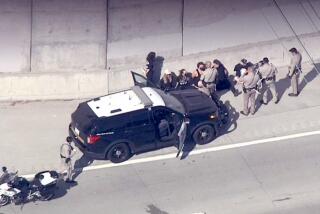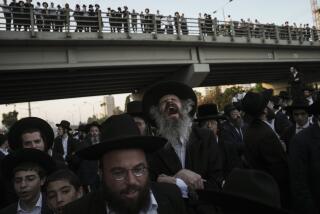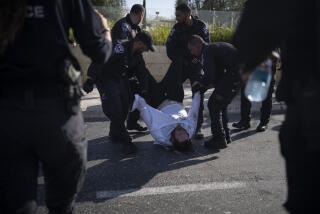Sabbath Driving in Israel Stirs Fewer Passions
- Share via
JERUSALEM — Apparently responding to appeals for restraint by government and religious officials, smaller-than-expected crowds turned out here Saturday to protest a Supreme Court ruling that allows cars to travel on a main thoroughfare on the Jewish Sabbath.
Police said the ultra-Orthodox demonstrators threw a few stones and shattered the windshields of two cars traveling on the disputed road but that no one was injured. An estimated 4,000 to 5,000 people took part, a police spokesman said. A similar protest last month drew as many as 100,000.
The court ruled Thursday that Bar Ilan Street, which borders an ultra-Orthodox neighborhood, will remain open while a committee studies the broader question of government policy on Sabbath street closures throughout the city.
Several ultra-Orthodox leaders reacted angrily to the court decision, calling on their followers to demonstrate Saturday on Bar Ilan and at major intersections in Jerusalem.
Bar Ilan Street has become a flash point in an intensifying struggle for control of Jerusalem.
The ultra-Orthodox believe that the road should be closed to traffic on the Jewish Sabbath, which lasts from sundown Friday to sundown Saturday, or at least during specified Sabbath prayer times. They adhere to a strict interpretation of Jewish law, which forbids all forms of labor, including driving, on the Sabbath.
“Why must people drive on this street on this day?” asked ultra-Orthodox Rabbi Avraham Ravitz, a member of parliament. “Let us have our kind of good time, a spiritual kind of good time, on the Sabbath.”
But many secular residents fear that if the ultra-Orthodox succeed in closing Bar Ilan, they will try to shut down other streets each Saturday.
“People understand this is the beginning of a culture war,” said Ornan Yekutieli, a Jerusalem City Council member whose leftist Meretz Party has been leading the effort to keep the road open. “The religious people are saying they want Jerusalem to be a holy city, but they are throwing stones, injuring people and damaging cars.
“On our side, we say it is a holy city but also the capital of Israel. If they close this street, we are taking a big step toward being like Tehran,” Yekutieli said.
More to Read
Sign up for Essential California
The most important California stories and recommendations in your inbox every morning.
You may occasionally receive promotional content from the Los Angeles Times.













